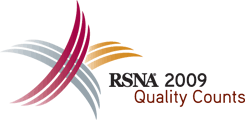
Abstract Archives of the RSNA, 2009
LL-PH4148-B06
First Experience Using Automated Whole Breast 3D (AWB 3D) Ultrasound
Scientific Posters
Presented on November 29, 2009
Presented as part of LL-PH-B: Physics
Alberto Martegani MD, Presenter: Research Consultant, Helix Medical Systems Ltd, Seattle, WA
Research Consultant, Esaote SpA, Genoa, Italy
Loredana Tufarulo MD, Abstract Co-Author: Nothing to Disclose
Rita Campi MD, Abstract Co-Author: Nothing to Disclose
Maria Luigia Ciancio MD, Abstract Co-Author: Nothing to Disclose
Luca Aiani MD, Abstract Co-Author: Research Consultant, Esaote SpA, Genoa, Italy
Francesca Invernizzi MD, Abstract Co-Author: Nothing to Disclose
2D “like original” views was more efficient in detection of the lesions in images generates by a 3D automated system of ultrasound .Nevertheless combining with navigation tool all different views it is possible to obtain an accurate topographic definition. Automated whole breast ultrasound may have clinical utility as a cancer screening tool.
The role ultrasound plays in characterization of breast disease is well established. However, successful results are dependent on operator skill .
Automating techniques can reduce dependence on operator skill .
We evaluated the specific images characteristics produced by an automated rotating whole breast 3D (AWB 3D) device .
We used the CBUS 3000® (Helix Medical Systems, Ltd., Gilon, Israel) to evaluate 32 women (35 lesions) from January to April 2009. The CBUS 3000 AWB 3D device is designed to be compatible with all commercially available US scanners meeting a minimum performance standard .
Patients were placed in a prone position on as purpose built examination table. The US transducer is automatically rotated 360 degrees in a radial fashion around the breast. Each rotation took approximately 60 seconds.
The US images were collected using a fast, high resolution frame grabber connected to the video output of the US machine.
Immediate reconstruction of the images into a 3D volume data set was accomplished using a PC.
The images layout includes an axial, sagittal and coronal reformatted image plus the corresponding original image. A automated navigation system is available.
We evaluated only one lesion in each patient and compare the morphological aspect of reconstructed images with original 2D acquired image.
All the 35 lesions detected by “free hand” ultrasound were detected also by 3D automated system. In particular all lesions were evident on “like original” images whereas 10 and 12 were detected in sagittal and axial reformatted images. The coronal view allows the detection of 26 lesions; nevertheless on coronary view images was possible to obtain a better demonstration of topographic rapports between the lesions and surrounding anatomic structures.
Martegani, A,
Tufarulo, L,
Campi, R,
Ciancio, M,
Aiani, L,
Invernizzi, F,
First Experience Using Automated Whole Breast 3D (AWB 3D) Ultrasound. Radiological Society of North America 2009 Scientific Assembly and Annual Meeting, November 29 - December 4, 2009 ,Chicago IL.
http://archive.rsna.org/2009/8014542.html

